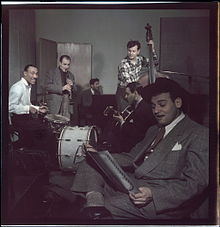Mule train
Mule Train is a song written by Fred Glickman , Hy Heath, and Johnny Lange that was released in 1949 and became a number one hit in the United States in 1949-50.
The songwriting team Glickman (1903–1981), Heath (1890–1965) and Lange (1905–2006) wrote Mule Train for the western Rauchende Pistolen (original title: Singing Guns , 1950, directed by RG Springsteen), with Vaughn Monroe , Ella Raines and Walter Brennan in the lead roles. Mule Train is featured in the film by Vaughn Monroe. The film was soon forgotten, but Mule Train became one of the most successful novelty songs of the year; Vaughn Monroe's version of the song (released on RCA Victor 20-3600 in late 1949 , with B-side Singing My Way Back Home ) made the top ten, but Frankie Laine's cover version had an even bigger hit . When Mitch Miller introduced him to the song over the phone, the singer was initially horrified:
- Jesus Christ, you can't expect me to do a cowboy song! I'll lose all my jazz fans. I'll lose everybody who ever loved That's My Desire .
- “Jesse, you can't expect me to sing a cowboy song! I will lose all my jazz fans! I will lose everyone who likes That's My Desire . "
Mitch Miller was finally able to persuade the singer to record a few takes of Mule Train , with Miller accompanying him on guitar, accordion and drum and with background vocals. The song gave the team their first million-dollar hit.
The song received an Oscar nomination for Best Song in 1951 . The first two lines of the song are: Mule train, yeah, yeah. Mule train: clippetty-clopping over hill and plain.
Frankie Laine's version of Mule Train with its roughness and angularity was at the time for the audience as a song "by a white American singer something completely unusual". The production of Mule Train also established the career of Mitch Miller; The early use of sound effects is emphasized. In this context, Will Friedwald described Miller as "one of the inventors of the rock'n'roll mentality".
Laine's version of the song was released on Mercury Records 78-5345, with the B-side Carry Me Back To Old Virginny, and was number one hit in the United States for six weeks (November 26, 1949 - January 6, 1950) . Vaughn Monroe's version made it to number 10 on the US charts; Other cover versions of Mule Train recorded in the 1940s and 50s Tennessee Ernie Ford (Capitol CL 13237, 1949, # 9 Pop, # 1 Country), Burt Ives (on Columbia), Bing Crosby (Brunswick, # 4 in the Pop Charts), Gordon MacRae (# 14 Pop), Frank Ifield (Columbia 1963), Bob Summers , Freddie and The Heartaches (Dot, 1961), Rex Turner (Varsity), Gene Autry (Columbia) and Woody Herman and His Orchestra with Nat King Cole (Capitol).
Individual evidence
- ↑ The Chicago native Fred Glickman was a composer, songwriter, author, violinist and publisher. See Don Tyler: Hit songs, 1900-1955: American popular music of the pre-rock era , 2007
- ↑ smoking guns in the Internet Movie Database (English)
- ^ Billboard December 10, 1949
- ^ A b Elijah Wald: How The Beatles Destroyed Rock 'n' Roll: An Alternative of American Popular Music . 2011. p. 157
- ^ The 1951 Oscars in the Internet Movie Data Base
- ↑ http://www.metrolyrics.com/mule-train-lyrics-frankie-laine.html
- ↑ Archived copy ( Memento of the original dated December 8, 2007 in the Internet Archive ) Info: The archive link was inserted automatically and has not yet been checked. Please check the original and archive link according to the instructions and then remove this notice.
- ↑ Larry Birnbaum: Before Elvis: The Prehistory of Rock 'n' Roll , 2013, p. 347
- ^ Joel Whitburn, Top Pop Records 1940-1955. Record Research (1973).
- ↑ a b c d Don Cusic: The Cowboy in Country Music: An Historical Survey 2011, p. 239
- ↑ Tom Lord The Jazz Discography (online, accessed January 10, 2014)
